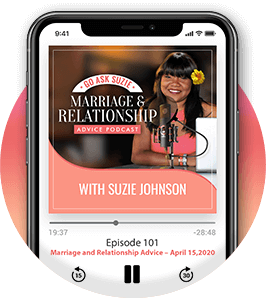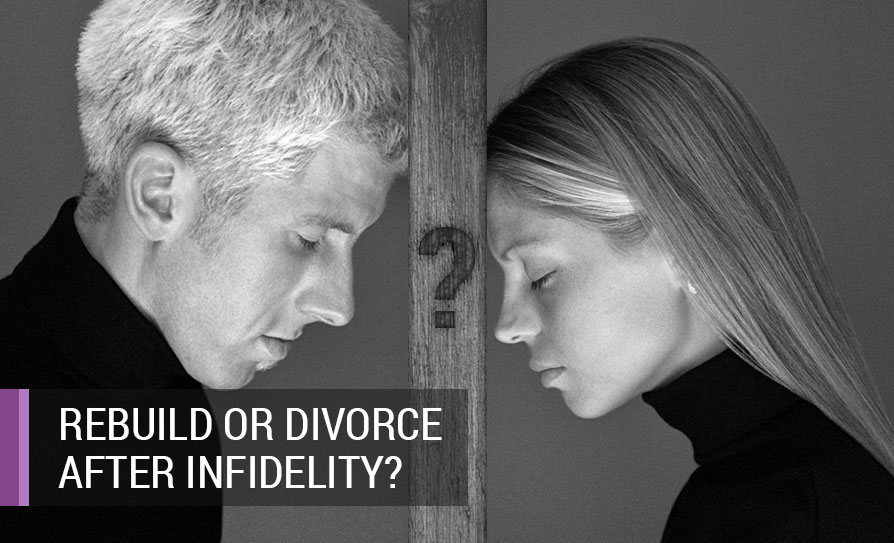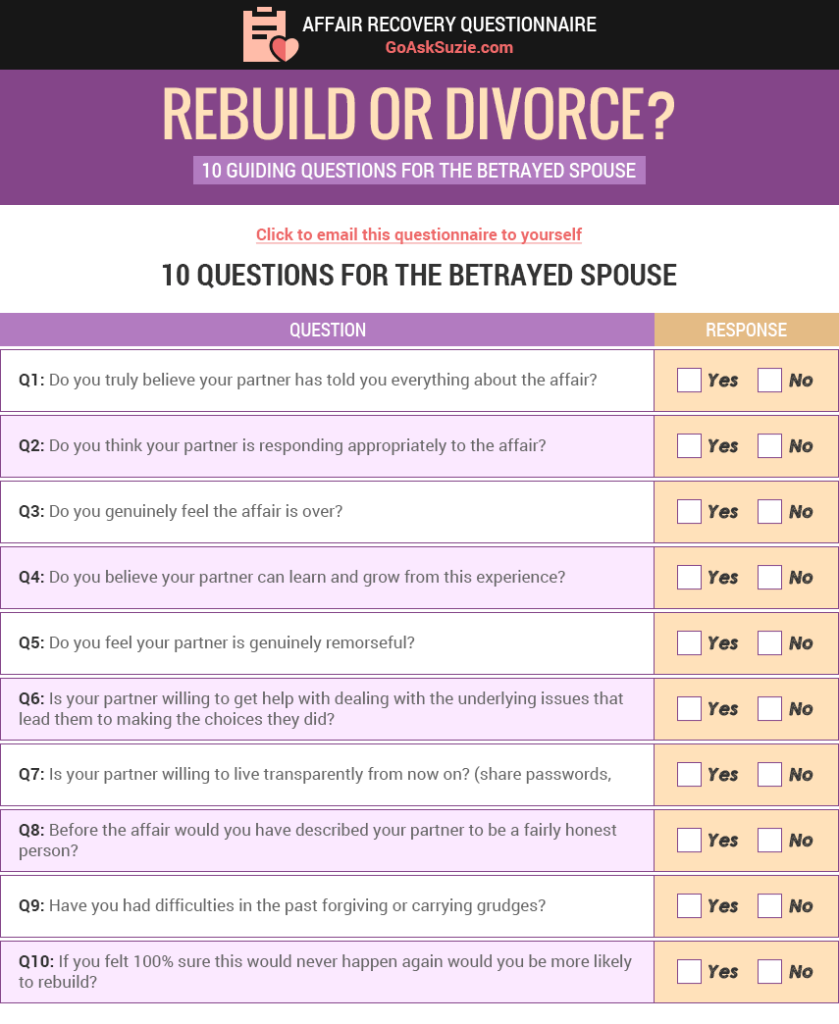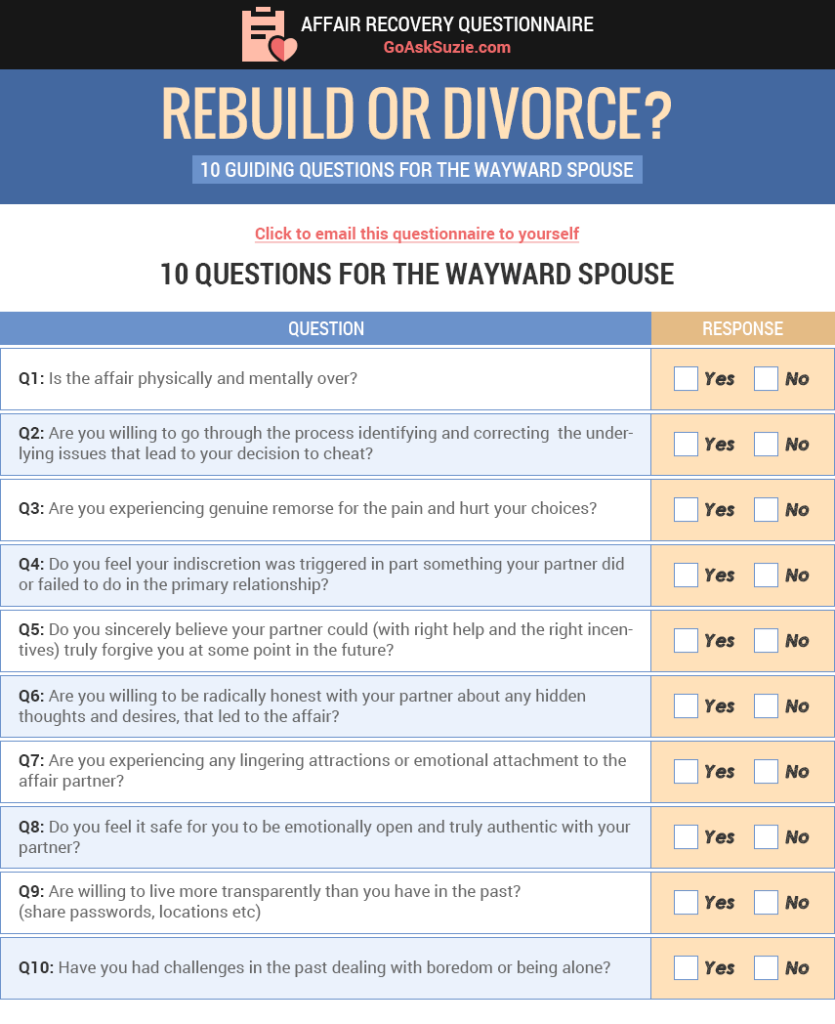Perhaps the biggest decision you will ever have to make...
Perhaps the biggest decision you will ever have to make – is whether to rebuild your marriage or divorce after an affair. Obviously, this is a decision not to be taken lightly.
In this article, I am going to share some insights gained from my 17+ years of experience in helping couples to rebuild their marriages after an affair. Included in this article, you’ll find my Rebuild or Divorce After the Affair Questionnaire. Previous readers have reported the questions helped them to gain clarity about their next steps. I hope the same for you. You can either use the menu below to jump to a specific section or start at the beginning and read along at your own pace.
Did you know?
For many years, scholars considered the Chinese language to be the “baby talk” of mankind. Why? Because Chinese isn’t based on an alphabet. Instead, it was based on graphic symbols that stand for entire words. Rather than complicate the language with a lot of nouns, verbs, and grammatical rules (as found in Greek and Latin) the Chinese have stripped down every word to its essential meaning and purpose.
In other words…
Chinese is simple and to the point. After realizing that language simplicity didn’t equal stupidity, scholars revised their opinion of the Chinese language. Now, they’ve declared it to be one of the world’s most sophisticated language systems. Why? Because Chinese has been stripped down to the essentials.
For example…
The word “crisis” in Chinese is two characters combined. The first character means “danger” (when a situation has reached an extremely difficult or dangerous point). The second character means “opportunity to turn for the better.”
So the Chinese word for crisis could be interpreted this way: a dangerous or difficult situation, which may also have the opportunity of taking a turn for the better.
I’ve always liked this idea.
I really like the idea that in a crisis, there could also be opportunity. Whether it’s a brush with cancer, infidelity, or bankruptcy…. that somewhere within life’s many adversities, hardships, difficulties, bad luck, wrong turns, or mistakes… there lurks the potential for things to turn around for the better.

Is Infidelity Both a Crisis and an Opportunity?
There’s no doubt about it…
Infidelity is one of the most painful types of adversity that can hit a marriage. And yet, according to Chinese wisdom, within every painful situation (including this one) if you’re willing to look — there’s a way to turn things toward the better.
Am I saying that infidelity is good for a marriage?
No. That’s not what I’m saying.
What I am saying, is that when we look at the wisdom hidden within the Chinese characters for adversity, you can search for the potential for good… even in the adversity facing you right now.
You can think about it this way…
A brush with infidelity – is both a crisis
and an opportunity to turn things for the better.
![]() Notice I said… if you are willing to look. This is an important distinction to make. Because there’s no law that says you must look for the opportunities within adversities. In fact, many never do (and I am totally okay with that). However, I do believe that trusting this type of wisdom, bestows a certain amount of hope. It tells us that no situation is stronger than your willingness to turn it around.
Notice I said… if you are willing to look. This is an important distinction to make. Because there’s no law that says you must look for the opportunities within adversities. In fact, many never do (and I am totally okay with that). However, I do believe that trusting this type of wisdom, bestows a certain amount of hope. It tells us that no situation is stronger than your willingness to turn it around.
No situation is stronger than your willingness to turn it around.
This idea centers around our innate capacity to have personal power over our adversities, which allows you to turn your adversities into advantages. What is this personal power I’m speaking of?
It’s called Resiliency.
Holding on to the idea that resiliency is a natural thing for all of us – let’s talk for a moment about the big question facing you right now.

Should You Rebuild or Divorce?
Just from looking at that question, there’s no easy answer is there? Because on one hand, we could say it’s a basic yes or no choice. But you and I both know it’s just not that simple. Because even though the decision itself is pretty straightforward (it’s either yes or it’s no) the impact of your decision is layered in so much complexity, there’s no easy way to know what the right answer is.
And therein lies the conundrum you currently find yourself facing.
Because, although the choice is simple – the result is not. You don’t just want to make a right decision; you also want to make a wise decision.
So, let’s clear up some confusion about what making good decisions is all about.
3 crucial steps to making good decisions
Good decision-making can be broken down into these three steps.
![]()
The Choice: What am I choosing between? Decision making is about choosing between two or more possible courses of action. In your case, that would be the choice between:
Option A: Rebuilding Your Relationship
Option B: Getting a Divorce
![]() The Tool: What tool will you use to help you arrive at the right choice? For this, there are two basic tools people use to help them arrive at the right choice. It’s either intuition or reason.
The Tool: What tool will you use to help you arrive at the right choice? For this, there are two basic tools people use to help them arrive at the right choice. It’s either intuition or reason.
Using intuition means
- Going with your “gut” feelings
- Having an almost magical sense of what to do
- Staying rooted in your past perceptions and experiences
- The answers feel powerfully accurate (without you knowing why)
Using reason means
- Having the facts in front of you
- Removing emotionality and ego
- Staying rooted in the current “here & now”
- Taking a structured approach (for example, writing down pros & cons)
![]() There’s nothing wrong with either of these decision-making tools. You can use one to help you make decisions. However, when working with my private clients, I prefer to coach them to use both.
There’s nothing wrong with either of these decision-making tools. You can use one to help you make decisions. However, when working with my private clients, I prefer to coach them to use both.
![]() Considering the consequences: How will making this choice impact me, my values and the people I care about? This means taking the time to “check-in” with yourself to ensure your final choice is going to be consistent with your core values.
Considering the consequences: How will making this choice impact me, my values and the people I care about? This means taking the time to “check-in” with yourself to ensure your final choice is going to be consistent with your core values.
Sadly, this step is often overlooked, and yet, it’s the one thing that separates right decisions from wise decisions.
Why is this?
![]() Because, by taking the time to make sure your choices are congruent with your core values, you significantly reduce your chances of encountering the leading destroyer of good decision making – future regret.
Because, by taking the time to make sure your choices are congruent with your core values, you significantly reduce your chances of encountering the leading destroyer of good decision making – future regret.
Make sense? (Good. Let’s keep going.)
So now that we know more about how to make good decisions – let’s talk about what usually gets in the way of people actually making good decisions.
2 things that can prevent good decision making
The 1st thing that prevents good decision making is overwhelm.
I don’t know about you, but overwhelm is one of my least favorite states to be in. Why? Because it tends to make me want to go for the “ostrich” approach, rather than just being proactive and facing a problem head-on. And when it comes to dealing with any stressful situation, this is never a good thing).
So, what exactly do I mean by overwhelm?
Good question. I describe overwhelm as the sensation of having too much incoming information coming in for us to manage (like too many emotions, too many thoughts or too many images).
Q: The biggest source of Overwhelm for betrayed partners?
A: Their own mind
I once heard a celebrity say…
“My deepest wish is for my mind to leave me alone”.
And as anyone who’s ever gone through this type of betrayal will tell you, this wish really hits home.
For most betrayed partners, the source of their overwhelm does not come from the outside. Their overwhelm is manufactured from within. It’s their own mind that creates the onslaught of images and chaotic thoughts. These thoughts produce emotional overwhelm, which in turn, leads them to obsess rather than process… and ostrich rather than getting proactive about making decisions.
 What’s the antidote?
What’s the antidote?
My advice for dealing with mental-emotional overwhelm is to simplify strip everything down to the basics. One way you can do this by doing the following.

Use “ONE” as your mantra word whenever you’re feeling overwhelmed.
→ Take ONE BREATH at a time
→ Take ONE STEP at a time
→ Take ONE DAY at a time
Keep this in mind.
Whenever you are feeling overwhelmed, the only decision you need to make is to reduce everything to ONE thing.
The 2nd thing that prevents good decision-making is… not having enough information.
Ironic isn’t it?
Too much information coming in all at once can cause problems. But at the same time, not having enough information can also cause problems.
Not having enough information when it comes to making decisions is one of the leading causes of making poor decisions. Let me give you some examples of how this applies in your case.
For example –
- Not having enough information about the affair can lead the betrayed partner to make naïve assumptions that later come back to haunt them
- Not having enough information on how to rebuild a marriage after infidelity can cause the betrayed partner to overcorrect (throw out the good with the bad) mis-correct (focus on the wrong things and ignore the right things)
- Not having enough information about the realities of divorce (like co-parenting, step-parents, emotional scaring, financial costs, etc.) can cause a betrayed partner to make emotional decisions that they later come to regret.
 What’s the antidote?
What’s the antidote?
Get all the information you can get before you make your final decision. This includes as much information as you can about the affair itself, and about what it takes to rebuild a marriage. Be willing to take a look at all the statistics and data you can find. Ask questions like: Are people usually happier after getting divorced? Are second and third marriages more secure? (You get the point.)
Rebuild or Divorce (Self-Assessment)
Coming up next
Now that you know more about making decisions and what gets in the way of making good ones… I’m going to share a questionnaire with you. It’s called Rebuild or Divorce After the Affair. The questionnaire contains 10 questions for the betrayed spouse and 10 questions for the wayward spouse. Answering these questions will help you evaluate what options are right for you. I invite you to use the questions as guideposts and pointers (but not as substitutes) for your own thinking.
How to Use the Self-Assessment Quiz
- There are 2 self-assessment questionnaires; one for the betrayed spouse and the other one is for the wayward spouse. Each questionnaire has just 10 questions.
- You can print the questionnaire, or have it emailed to you.
To make the most out of this self-assessment questionnaire
- Consider taking your questionnaire to marriage counseling to go over your concerns with your counselor, pastor, etc.
- Consider emailing it yourself and use the questionnaire as a conversation starter for you and your partner to discuss your options.

Choose the appropriate questionnaire below

(takes less than 2 minutes to complete)
Putting It All Together
So, how did you do on your answers?
Remember. The more sincere your YES answers… the higher your chances of successfully rebuilding your marriage after an affair.
Am I saying…
You shouldn’t rebuild your marriage if you had more “no answers” than yes answers? No! No! No! That’s not what I am saying at all. These questions are indicators not guarantors of success.
But I don’t want you going into your decision to rebuild or divorce blindly.
Even if you did have more no answers than you had hoped for, then it simply means you are going to have a few more things to work on in order to successfully rebuild the kind of marriage you both want. You deserve a marriage that is nearly infidelity-proof against future temptations.
Some options.
After an affair, there are basically two options for betrayed partners; you either rebuild your marriage, or you divorce your spouse and start over.
And I believe…
This is a decision only you can make (not your therapist, not your pastor, not your priest, or not your psychic) and that’s because
you are the only true authority in your life.
And as you consider that – consider this:
This article (like every other article on my website) wasn’t written to tell you what to do, but rather to help you ask yourself better questions.
And because the right answers come from within – it means you really need to be willing to ask yourself the type of tough questions that helps you to discover real clarity.
Doing this will help to reduce the risk of future regret and help you to feel more confident about which decision is truly right for you.
And if you are ready to take another step towards finding that clarity, here are my three best NEXT STEP recommendations.

Recommendations
Recommendation #3: Download the self-assessment questionnaires so you can share them with your partner and have copies for yourself. You will find going over these with your partner is a fantastic way to get a difficult (but meaningful) conversation started.
Recommendation #2: Discuss your answers with each other. If you want to get the best results, you’ll want to both set your hurt and frustration to the side, keep an open mind, make it safe, to be honest with each other, and be willing to listen to each other’s concerns and fears. Make a point to pay special attention to each of the no answers you each had on your individual questionnaires and do your best to truly hear each other from a compassionate, loving place.
![]()
MY MARRIAGE REHAB COUPLES MASTERCLASS COLLECTION
If you decide you want to rebuild your marriage and you want to ensure you have the best tools, tips and strategies and practices that will not only ensure your marriage survives, but that you go on to thrive as a couple and remain infidelity-free for life… then, you’ll both want to consider taking my Marriage Rehab Online Masterclass.
In this course, you are going to learn my absolute favorite strategies, tips, secrets, nuances, and techniques. I didn’t include them because I like them, but instead because they have been “field-tested” to actually work. And they continue to prove themselves… day in and day out.
Am I saying…?
….rather than just learning from me, what you are in fact going to be doing, is learning from the insights and experiences from hundreds of other couples who have successfully climbed this mountain before you? Yes! That’s exactly what I’m saying.
And yet, you don’t have to just take my word for it. You can find out more about the masterclass for couples here.
I believe you’ll be happy you did.
Until we speak again…
Remember… Love Wins!



































